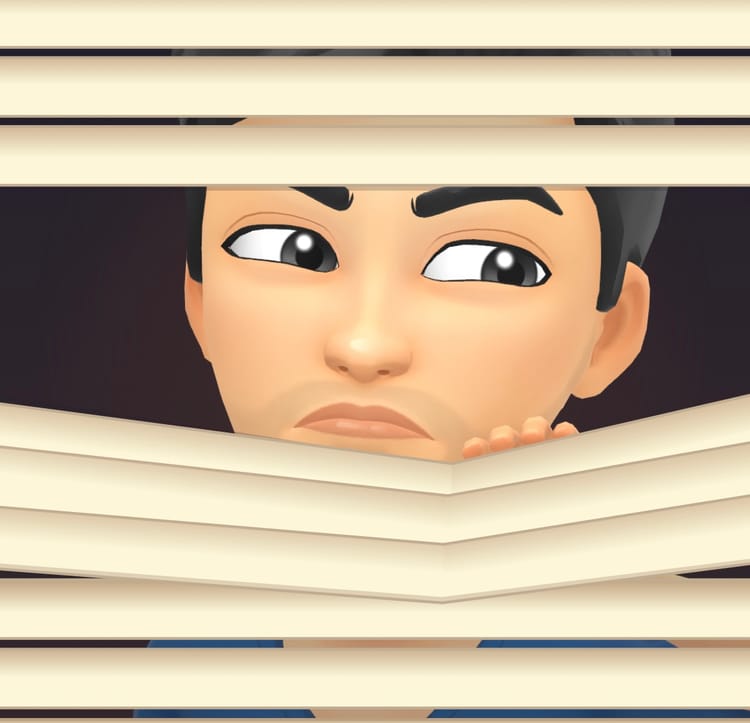❄️ Freezethawed: The Newsletter #026 - Building 'brain-space'
Hello everyone!
Imagine you are in your living room. This is your physical space.
Your living room is made up of various creature comforts like a couch, a television, a table, a rug etc. Some are new, some aren’t. It may be crowded but it belongs to you. There may be some things that you’d like to get rid off, if you could. Some, not soo much. Irrespective, this is a space you call your own, for rest, relaxation or entertainment.
Now what if you wanted to add something to this space?
For argument’s sake, let us assume it is a new wall-mounted painting you recently picked up. What are the ways you could do so?
You could shift all the things around to ‘make room’. You could replace something. Or, maybe, luckily there is still a corner where this painting can go up without much hassle.
Now. I ask you to convert this into a mental model. The living room is your brain. All the furniture are the thoughts, tasks and to-do’s that occupy it. Just like your living room, your brain has only finite room, so should you want to learn or do something new, you need to brain-space to accommodate it.
Often just as our living room can be an unnecessary mess, so can our brain. Sometimes, a little mental decluttering can free up a lot of space.
What is brain-space and why do we need it?
Brain-space is exactly what it sounds like. It is virtual space in our brain to do either what we need to, or what we love. Just like physical space, brain-space can also get cluttered up if we aren’t careful about how we litter it. Also, just like our physical space, our brain-space needs some moping and cleaning once in a while.
A cluttered physical space makes getting work done rather difficult. Our virtual space works in the same way. If you are finding it difficult to finish a task or pick up that hobby you’ve been wanting to, maybe you’ve cluttered up all your brain-space. As a result, your brain is working sub-optimally.
How to free up brain-space?
- General housekeeping: Renegade thoughts that will not lead anywhere and those which are generally out of our control, often accumulate like dust in a room. A weekly mental cleansing helps keep things spick and span. If you’re a fan of having a tidy room, you’ll love having a tidy brain.
- Move the furniture around: Often just shuffling up the location of the furniture around the room can free up hidden space. In our mind, this can be equated to segregating work and tasks so that we can find smarter, swifter and quicker means of completing them. Batching similar tasks is another easy and efficient way.
- Replace the old: Seems quite obvious but this is probably the hardest thing to do. As creatures of comfort we tend to hold on to everything beyond plausibility, feeling its absence may cause us great discomfort. Often this is absolutely untrue. Letting go, is sometimes easier than holding on. In our physical space it maybe an old television, a torn piece of upholstery or something alike. In our brain-space it maybe an irrational grudge or a rude memory.
- Prioritise: Probably the easiest thing to do. As humans, if evolution is any indication, we are terrible multitaskers. The easiest way to prioritise in my opinion, is to segregate everything into ‘important’ or ‘urgent.’Urgent tasks are ones that we have to complete because they are required to be completed. For example, paying the phone bill. Important tasks fall in line just after that. They are important because they lead to our growth, over time. Anything that isn’t urgent or important, can wait.
- Catch of the day: Finally, getting to the point I’ve been wanting to make. There will come a time when you would wish to make that extravagant purchase for your living room. A reclining chair, for example. There will be many arguments that your mind will put forth against it. But the ultimate decision lies, among other things, on whether there is physical space for it. A mental model for this would be the procrastination involved while picking up a new skill or habit. Taking piano lessons, for example. No matter what you tell yourself, the deciding factor for this is whether you can make the ‘brain-space’ for it. The quicker you actively try to free the brain-space for this, the sooner you can convince yourself that you can take up these lessons.
Recognise and familiarize yourself with your current brain-space. Identify tasks that are like furniture occupying it and thoughts that are dust. I hope this was a fruitful read into maybe understanding how your brain works as well as an insight into how you can leverage its full potential.
Until next time!
Anujeet.

Anujeet’s book journey
Currently I am reading:
Anxious People – Fredrick Backman
Aggregate, the weekly quote
The fundamental cure for poverty is not money, but knowledge.
- Sir Arthur Lewis
Harmony, the weekly song
What Colour Is Your Raindrop - Tajdar Junaid
Enjoyed the read? Consider subscribing to my newsletter, ❄️ Freezethawed, to get a weekly update on thoughts pondered upon by me, insights I’ve been exposed to and may be some interesting facts I’ve encountered – delivered straight to your inbox. Click here: ❄️ Freezethawed: The Newsletter




